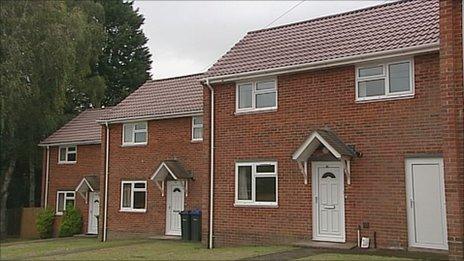British Army troops leaving Germany after 70 years
- Published
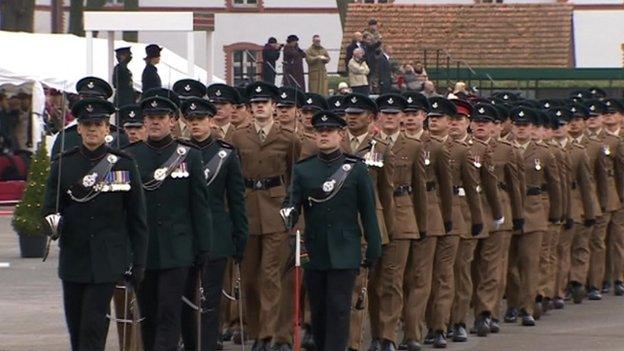
5 Rifles are expected to start moving from Germany to Salisbury Plain in the summer
After 70 years, British troops are leaving Germany in one of the biggest moves undertaken by the Army in decades.
Six regional hubs in England will host 39,000 troops and their families by 2020, as part of a wider defence shake-up, with a further 4,000 in Edinburgh and Leuchars.
Former defence secretary Philip Hammond described it as the "end of an era", but with some of the largest numbers yet to be repatriated since the scheme began in 2010, what will the impact be on communities in England as well as those families leaving German bases behind?
"There are families that know nothing other than the support structures in Germany," said Col Neil Page.
"Most of the army trickles people through [Germany], but in some regiments, once you're in a unit you're likely to stay there."
Col Page is a member of the Army Basing Team, which is responsible for bringing 20,000 troops and their families home by the end of the decade, in a move designed to save money and improve operational capabilities.
"There's lots of families involved and we have to make sure there's health, and education provision in there," he said.
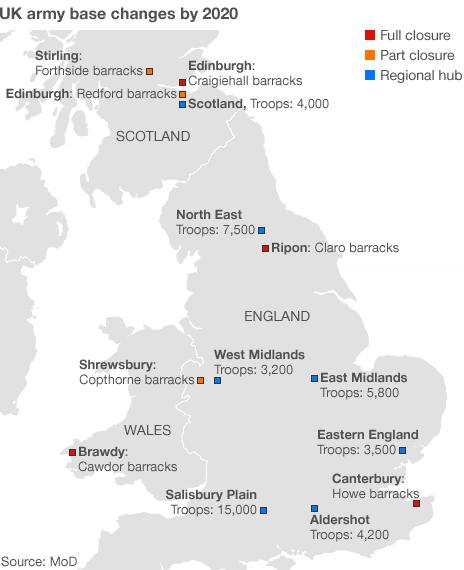
The 5 Rifles Company is set to start moving from Paderborn to Bulford on Salisbury Plain in the summer.
Sgt Russell Potter, of the battalion, and his wife Stefanie said there would be a "little bit of disappointment" in leaving Germany, but many families would treat it as "an adventure".
"You've got all your friends. It's not like you're moving places where you're not going to know anyone," Mrs Potter said.
With so many troops moving back to the UK though the challenge is not only one for the army.
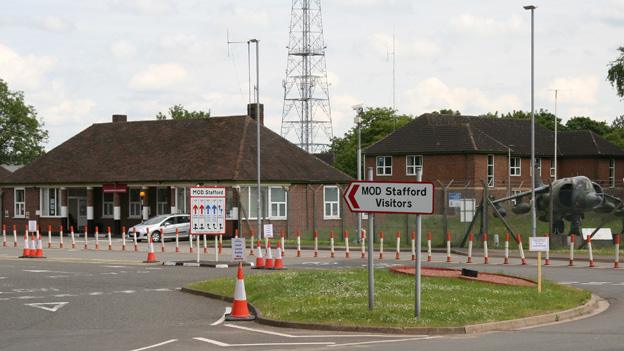
RAF Stafford was renamed Beacon Barracks when the air force pulled out of the town as part of another reorganisation of the armed forces
Staffordshire County Council is among several local authorities to send staff to Germany, to provide support for troops and their families as they gear up for the move.
Just over 1,000 troops, plus their families, from 1st Armoured Division Signal Regiment and 16th Signal Regiment will leave the Gütersloh and Rhine garrisons behind to join 22 Signals at Stafford's Beacon Barracks.
Many of them are young families and that means extra pressure on local services such as schools, housing, hospitals, dentists and GPs.
In Stafford, extra schools are being built including the Veritas Academy, which will provide 420 primary places, 300 of which expected to be for Ministry of Defence (MoD) families. Secondary schools in the area are also being expanded.
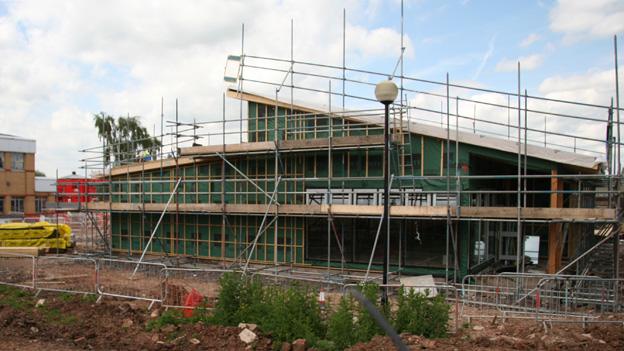
The Veritas Academy is due to be completed by September
Yateen Bhoola, executive head teacher of the Veritas Academy, said the school had a liaison officer based in Germany and had sent other staff over.
"It's really for us to be able to get to know the children, the families, so by the time they arrive in September we've got all the support structures in place so if there are children with special educational needs, all of that will already be in place," he said.
"We know the transition could be quite unsettling, because it's another new environment for the children."


Stafford residents by and large welcomed the effect the extra troops are expected to have on the local economy, but some questioned how the hospital would cope
The Stafford view
"I think it could work two ways," resident Julie Green said.
"It'll bring trade to the town, but I'm not sure how it will affect other things, particularly the hospital. We've already lost the maternity unit.
"The roads are already a bit of a nightmare, particularly around Beaconside."
Allan Preece said the troops' arrival will "improve things greatly".
"Families will spend money in the town," he said. "They've known about this for some time, so I don't think there will be any problems."
Les Jones said while the move would have a "positive impact" on the local economy, it would be offset by the number of students leaving as part of Staffordshire University's move to Stoke-on-Trent.
About 2,400 students are expected to quit Stafford by 2016.
"I'm sure it will improve spending in the town centre, but what about the hospital?" Sharon Marks asked.
"They've shut maternity and paediatrics, and many of those coming will be young families."

Of the six areas of England to see troops arrive under the army's Borona basing project, external, Wiltshire will see the biggest influx.
By 2020, 15,000 troops will be based on Salisbury Plain. The army's plans will see an extra 4,300 personnel, including 5 Rifles, move into the area, as well as about 3,300 dependents.
Wiltshire Council, however, is an old hand at this.
"We learned the hard way," leader Jane Scott said.
"We had a large military presence, but it wasn't working well. Families would move away and schools would empty and we'd have no prior knowledge. Equally 100 children might suddenly arrive."
Nine years ago a military-civilian board was set up to improve communication.
This time round, Wiltshire expects an influx of 1,400 school-age and 800 pre-school children.
Two new primary schools are being built, as well as an extension at a third. Extra secondary school places are also planned.
"Every child needs to have a school place. We need to know about any child with special educational needs," Mrs Scott said.
"There also need to be enough maternity beds, enough capacity in A&E."
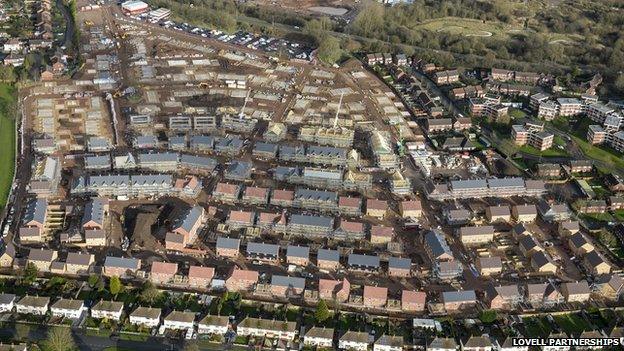
More than 340 homes are due to be completed in Stafford by September to cater for the new troops
The MoD is investing £1.8bn in the overall re-basing programme, plus funding from the Department for Education and other governmental departments.
In Stafford, the £150m work will see new barracks accommodation, offices, workshops, shops and leisure facilities.
Developer Lovell Partnerships is currently building 346 homes as part of a £51m MoD contract, which director John Leary described as "clearly significant" for the firm.

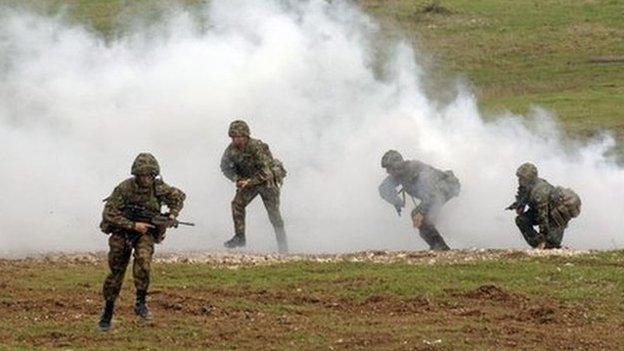
The Army 2020 programme plans to reduce overall troop numbers by 20% by the end of the decade as part of wider defence cuts
Troop relocation
Some 10,000 troops have already returned from Germany since 2010
Thousands more soldiers are being moved within the UK
The wider project will see four bases close across the UK, with partial closures at three others
The government claims it will save £250m in operating costs.
In terms of scale, the only equivalent in recent years is the withdrawal from Afghanistan.
Col Page said: "It's difficult to say which is more challenging. Afghanistan is an operational base, with a terrific amount of logistics and equipment, as well as troops.
"But in Germany it's quite different, because there's lots of families involved."

According to the government, bringing troops back from Germany is expected to save £240m a year in running costs.
But that could just be the tip of the financial iceberg.
In 2004, the 25,000 troops stationed in Germany were estimated to contribute 1.5 billion Euros a year, external to the economy, either through jobs, contractors or spend in local shops.
Staffordshire County Council believes such benefits will be felt in the UK, with the extra troops at Beacon Barracks expected to bring in an extra £90m to the wider West Midlands economy as well as 700 jobs.
- Published3 July 2013
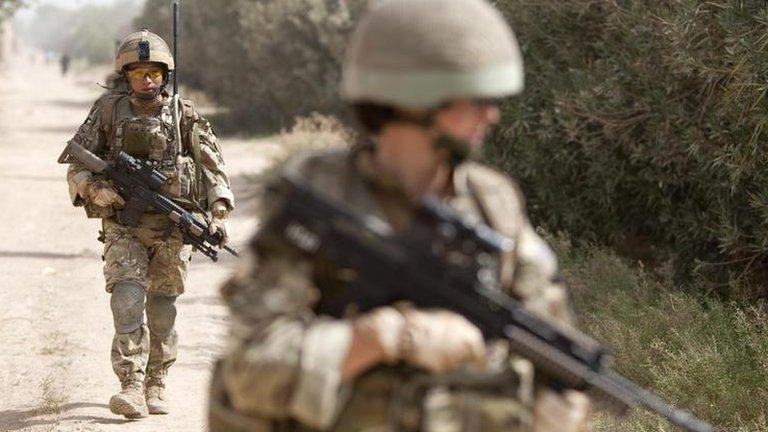
- Published20 November 2014
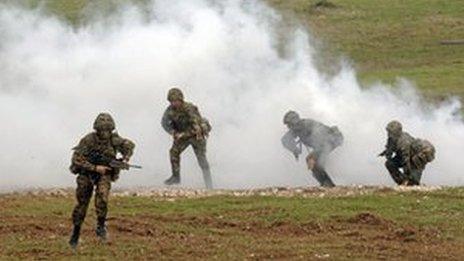
- Published29 May 2014

- Published5 March 2013

- Published5 March 2013
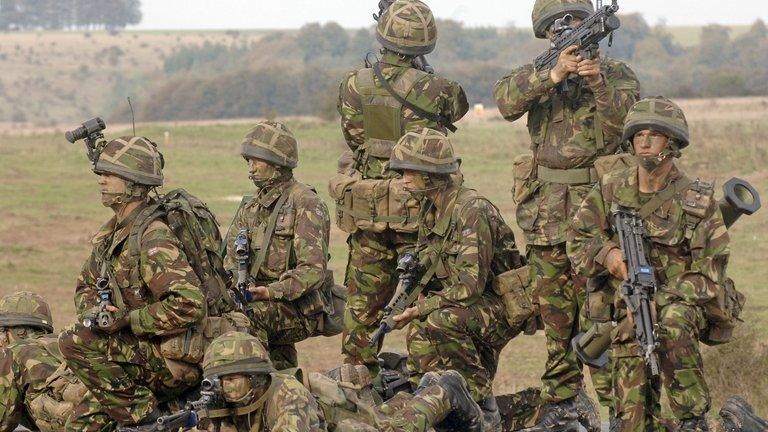
- Published5 July 2012

- Published10 November 2011
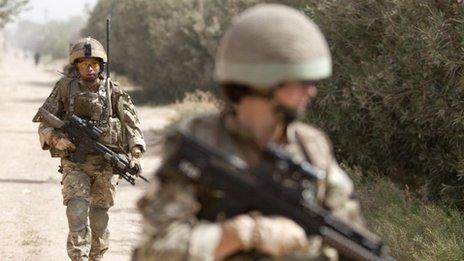
- Published20 September 2011
